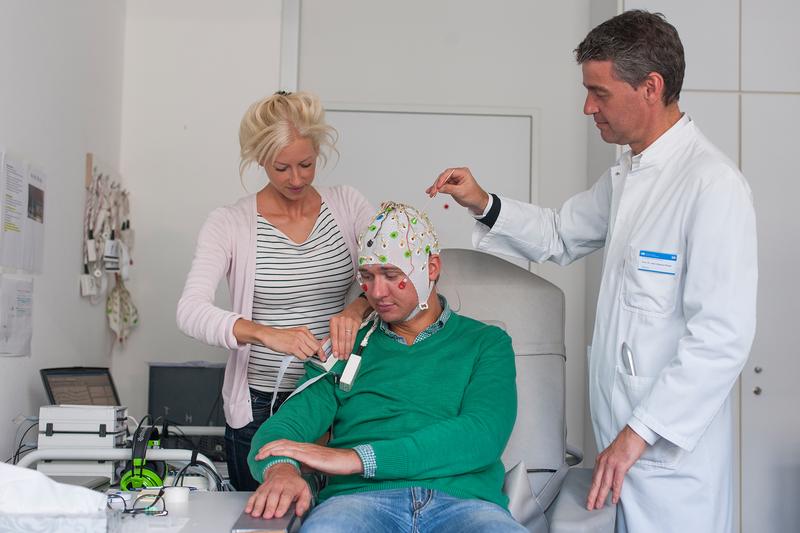
Understanding Pain: Brain’s Perception and Motor Impulses Unlinked

Laura Tiemann, first author of the new study about pain perception, prepares together with Markus Ploner, Heisenberg Professor for Human Pain Research, a volunteer for the EEG-measurements.
Kurt Bauer / Technical University of Munich
Led by Markus Ploner, Heisenberg Professor for Human Pain Research, scientists from the Department of Neurology of the university hospital TUM Klinikum rechts der Isar investigated in detail how a painful event is processed in the brain.
For the first time they were able to show that the brain yields at least three different responses to a painful stimulus, and that these responses are simultaneous and independent of one another. The results may have fundamental repercussions for the understanding of pain and treatment of pain patients.
Pain embodies at least three factors: Perception of pain, an action such as withdrawing the hand from a hot stove, and a response of the autonomic nervous system which provides the necessary energy for the action. The autonomic nervous system controls essential functions such as heart rate, breathing, digestion and metabolism.
Combination of behavioral and EEG measurements
In their experiments, the researchers applied short pain stimuli of varying strengths to the back of the hand of healthy volunteers. The perception of pain was determined based on the participants evaluation of the stimulus on a rating scale.
The team, led by Markus Ploner, investigated the action component based on the reaction time the subjects needed to withdraw their fingers in response to the stimulus. Moreover, to determine the response of the autonomic nervous system, the team measured the sweat production at the interior surface of the hand.
For the entire duration of the experiment, brain activity was measured using electroencephalography (EEG). This method provides highly precise information on when and how nerve cells react to pain stimuli.
Pain components arise independently of one another
Ploner and his team applied a statistical method known as mediation analysis to the data. The method has been well established in the social sciences for some time now; however, this was its first application to EEG data. The team was thus able to find out which brain responses serve the three pain components, and when exactly they take place.
The results of the evaluations surprised the researchers: “For the first time we were able to see that the brain responses to the pain components did not take place one after the other, but rather in part simultaneously.
This means that the preparation for action and the provision of energy are not entirely dependent on the perception of pain; instead they are in part triggered independently of one another,” explains Laura Tiemann, the study's lead author.
Comprehensive pain therapy for chronic pain patients
Although at first rather abstract, these findings could be of great importance to patients suffering from chronic pain. Ploner recommends considering all three components of pain in comprehensive pain therapy: “For chronic pain patients, it is possible that not only the perception of pain, but also the preparation and performance of actions against pain and the provision of the energy to do so are changed. Our findings are thus a biological argument for holistic pain therapy approaches that take different pain components into account. Such approaches would include psychotherapy and drug therapy as well as physiotherapy,” Ploner says. This kind of therapy, referred to as Multimodal Pain Therapy, is already being offered at the TUM Interdisciplinary Center for Pain Medicine.
Prof. Dr. Markus Ploner
Department of Neurology of the university hospital
Klinikum rechts der Isar of the Technical University of Munich
Tel.: 089 4140-4608
markus.ploner@tum.de
Laura Tiemann, Vanessa D. Hohn, Son Ta Dinh, Elisabeth S. May, Moritz M. Nickel, Joachim Gross and Markus Ploner: Distinct patterns of brain activity mediate perceptual and motor and autonomic responses to noxious stimuli, Nature Communications, October 2018, DOI: 10.1038/s41467-018-06875-x (Open Access).
https://www.nature.com/articles/s41467-018-06875-x
http://www.professoren.tum.de/en/ploner-markus/ – Profile of Prof. Markus Ploner
https://www.painlabmunich.de/ – Research group of Markus Ploner
https://mediatum.ub.tum.de/1468890 – Download High Resolution Image












